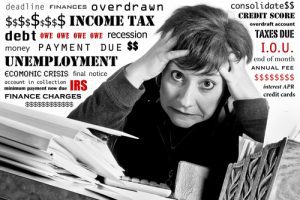Organization Is Key To Reducing Tax Stress
 Taxes are coming due very soon, less than a month away. We’re all double-checking our last minute stuff. If you’re smart, you’ve already worked on it and have it almost done. It’s always better to get done early than rush it at the last minute. But what’s the best way to organize? Let’s take a look.
Taxes are coming due very soon, less than a month away. We’re all double-checking our last minute stuff. If you’re smart, you’ve already worked on it and have it almost done. It’s always better to get done early than rush it at the last minute. But what’s the best way to organize? Let’s take a look.
Best Ways To Organize Your Taxes
1. Divide Documents Into Categories
When everything is just shoved together in a single drawer, it’s going to be hard to find anything specific, even if you have everything you need. The best way to organize your documents is to divide them up into categories. First and foremost, always separate business from personal. Mixing up the two is a great way to not just lose track of things, but to get you fined.
After that, consider some of the following categories: office expenses, vehicle expenses, education costs, child care costs, medical expenses. Categories should fit around things that are taxed the same way so that it’s easier to find different documents related to different tax forms.
2. Back Up Documents Electronically
It’s very important to have back-ups. Electronic back-ups are the best, as they take up little physical space and can easily be re-copied if you need to. Electronic documents are also much faster to look up with computer search functions. Don’t ever rely entirely on electronic documents, however. While they are super convenient, it’s possible that an accident – like dropping a laptop, or a hard-drive crash – could cause you to lose them. Having both paper and electronic documents on hand is just a way to make sure no single accident can destroy all of your records and leave you out to dry.

Photo by Anete Lusina
3. Keep Your Documents Together
It seems obvious, but it’s amazing how things can get spread around. When you get documents you’ll need for tax purposes later, make sure you put them together. Have a filing cabinet (with dividers by the categories you set up) so that there’s an easy place to store them. For electronic documents, have a folder on your computer where all those documents are saved, with sub-folders to make searching faster. Having them all together means you never have to wonder about where they are.
4. Document As You Go
Do you find scanning a bunch of receipts for a couple of hours to be a fun time? If not, a good way to avoid this is to document everything as you go. Whenever you make a purchase or spend money that needs to be tracked for tax purposes, document it as soon as you can. Don’t let it sit for days waiting, or when you do get around to doing the documentation, you’ll have so much more to do. The more there is, the easier it is to get distracted and make mistakes.
5. Don’t Be Afraid To Get Rid of Old Documents
While you should definitely save your documentation in case it needs to be verified later, especially for taxes, keeping everything for years and years can leave you with too much to sort through. While it can be hard to tell how long you’ll need any given document, the seven-year-rule is a good rule of thumb. If you’ve held onto a document for more than seven years and it’s never been needed, there’s a good chance it never will. Just make sure that you shred these documents so the information on them can’t be stolen.
At the very least, if you don’t want to risk destroying old documents, separate anything more than seven years old and store it separately from the documents you’re more likely to need. That way, they won’t get in the way.
6. Set Up A Schedule to Manage It
As we said earlier, it’s very easy to put off working on your taxes, only to suddenly find the deadline pouncing on you. The best way to avoid this is to have a schedule for managing your paperwork. At least once a quarter, you should go through your files and make sure they’re all properly organized. You can even run calculations on the taxes so you have a good idea of where you’re sitting as the year progresses. That makes it easier to put it together when tax season rolls around.
7. Hire A Bookkeeper
It’s a lot of work managing your documents. While you can certainly do it yourself, is that really the best use of your time? If math isn’t something you’re particularly good at, or you’re bad at managing the constantly changing tax codes, maybe you should get some help. A bookkeeper, someone who’s trained in managing documents and expenses, can take the burden off of you and make sure it all gets done properly.
Why Not Get Help From Us This Tax Season?
Tax day may be right around the corner, but that doesn’t mean it’s too late to get some help. If you’re struggling to get everything organized, why not give us a call? We can help you get the mess under control and also set up systems to help prevent a mess in the future. If that sounds like something you need, then get in touch with us today!

